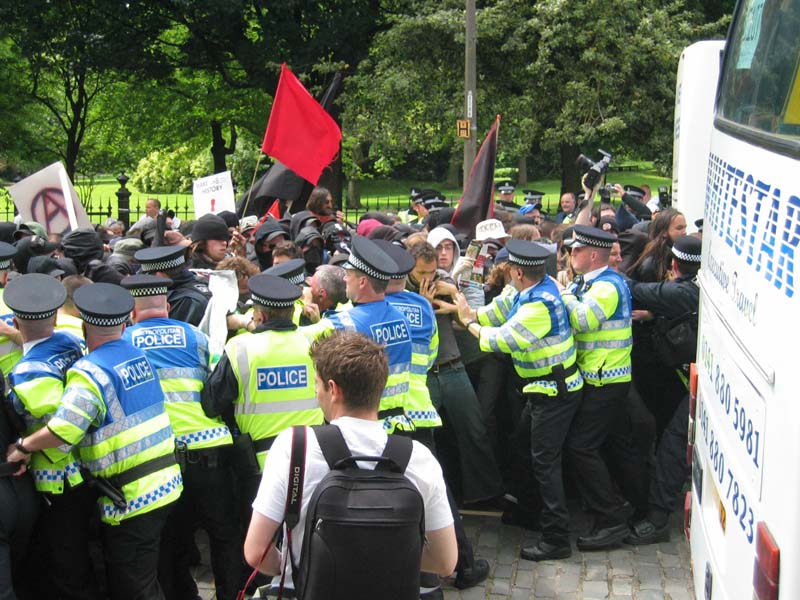
more action
By continuing your visit to this site, you accept the use of cookies. These ensure the smooth running of our services. Learn more.

By Alfred Wasike
PRESIDENT Yoweri Museveni has ordered the Police to arrest politicians threatening violence as Uganda transits towards change of political systems.

HUSSEIN BOGERE, KABONA ESIARA, AL MAHDI SENKABIRWA
KAMPALA
Riot police yesterday fired tear gas and water canons to disperse hundreds of demonstrators protesting against the move to lift presidential term limits.
The demonstration was organised by the opposition Forum for Democratic Change (FDC). It also included members of the Democratic Party, Uganda People’s Congress, JEEMA, The Free Movement and the Conservative Party.
Police deployed heavily at all the spots where the demonstrators were expected to gather or pass.
Work along Kampala Road and Parliament Avenue was interrupted for the entire morning as police battled the demonstrators.
The demonstration was meant to coincide with the first vote in Parliament on the proposal to remove term limits, a move that is widely believed will pave the way for President Yoweri Museveni to stand for re-election in 2006.
Mr Museveni’s last constitutional term expires next year.
The demonstration was planned to start from the Constitution Square at 10:00 pm.
However, police deployed more than 20 officials at the venue who confiscated the demonstrators’ placards and arrested two men from the Uganda Freedom Party (UFP).
Police claimed that the organisers of the demonstration had not informed them in advance. “The order is immediate; there is no demonstration, they should go away,” a police officer, who declined to be named, told Daily Monitor as the demonstrators were dispersed.
Kampala Regional Police Commander, Mr Oyo Nyeko, defended the police action.
“The opposition wrote to the Inspector General of Police but he wrote back calling off the demonstration,” Oyo told journalists at his office. “Parliament has to be informed 48 hours while the police have to be informed 72 hours before the demonstration can take place,” he added.
The demonstrators shouted anti-third term slogans and carried several placards denouncing the no-term limits proponents. Some of them read, “253 MPs cannot decide for 24 million Ugandans. Please say no to third term;” “MPs, don’t murder our constitution, yours peasants;” “US and the donor community, come and save us;” “Pearl of Africa is Pearl of Mafia;” and “What shall we tell the children in the north born in camps?”
Realising that they had been outnumbered, the demonstrators, mostly male youths, retreated to Crest House along Station Road singing anti-third term songs.
From there the procession comprising boda boda riders and seven mini buses moved along Nkrumah Road, to Owino, Ben Kiwanuka Street, past CPS, Speke Road before joining Kampala Road.
Battle begins
What had progressed as a peaceful march suddenly became violent when police deployed five pick-up truckloads of riot police and a spray truck at the junction of Kampala Road and Parliament Avenue. The demonstrators now numbering over 100 were sprayed with peppered water. A pick-up truck carrying some of the demonstrators was abandoned in the main road.
But the protestors did not take the punishment lying down. They threw stones at the police.
The crowd soon melted, only to re-emerge in front of Parliament.
But the police were there too. One parked car’s windshield was left shattered after a police rubber bullet blasted through it. Workers at Stanbic Bank, Standard Chartered Bank, Nile Bank and other nearby offices were seen inhaling through their handkerchiefs as the area around Parliament Avenue was filled with tear gas.
The scuffle also attracted several MPs from Parliament where business too came to a brief halt.
As time went by, the crowd grew smaller and eventually disappeared by 2:00 pm.
Conspicuously, apart from the FDC’s Beti Kamya and James Musinguzi, there were no other opposition leaders in sight.
Reposted from Monitor Media
Joram Jojo:
Play Video